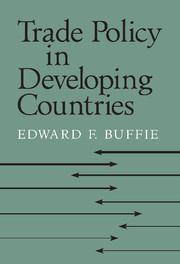Book contents
- Frontmatter
- Contents
- 1 Introduction
- 2 Tools and Tricks of the Trade, Part I: Duality Theory
- 3 The Trade Policy Debate
- 4 Tools and Tricks of the Trade, Part II: Linear Differential Equations and Dynamic Optimization
- 5 Underemployment, Underinvestment, and Optimal Trade Policy
- 6 Liberalization and the Transition Problem, Part I: Transitory Unemployment
- 7 Tools and Tricks of the Trade, Part III: The Dynamics of Temporary Shocks
- 8 Liberalization and the Transition Problem, Part II: Credibility and the Balance of Payments
- 9 Direct Foreign Investment, Economic Development, and Welfare
- 10 Suggestions for Future Research
- References
- Index
5 - Underemployment, Underinvestment, and Optimal Trade Policy
Published online by Cambridge University Press: 29 July 2009
- Frontmatter
- Contents
- 1 Introduction
- 2 Tools and Tricks of the Trade, Part I: Duality Theory
- 3 The Trade Policy Debate
- 4 Tools and Tricks of the Trade, Part II: Linear Differential Equations and Dynamic Optimization
- 5 Underemployment, Underinvestment, and Optimal Trade Policy
- 6 Liberalization and the Transition Problem, Part I: Transitory Unemployment
- 7 Tools and Tricks of the Trade, Part III: The Dynamics of Temporary Shocks
- 8 Liberalization and the Transition Problem, Part II: Credibility and the Balance of Payments
- 9 Direct Foreign Investment, Economic Development, and Welfare
- 10 Suggestions for Future Research
- References
- Index
Summary
Chapter 3 ended with the discouraging conclusion that we know much more about the consequences of bad trade policy than about the makeup of optimal trade policy. The orthodox critique of protection in LDCs has established to almost everyone's satisfaction that extreme import-substituting policies are detrimental. But what of less extreme policies? Is moderate protection appropriate in some countries? The answer of classical trade theory is a flat no: distortions in goods and factor markets which make protection welfare-improving can be dealt with more effectively by nontrade taxes and subsidies that directly counteract the source of market failure. Most countries are told therefore to move as rapidly and as far toward free trade as political contraints permit. The problem with this uncompromising position is that free trade is not optimal if nontrade taxes and subsidies incur greater administrative costs or present policy makers with a less favorable strategic environment than trade taxes. These qualifications matter. While it is not clear how much adverse strategic effects weaken the case for free trade, there is little doubt that administrative costs are important in practice. Fraud and enforcement problems are likely to undermine even moderately differentiated tax/subsidy systems; consequently, optimal tax policy boils down to finding simple systems that minimize demands on administrative capabilities and satisfy a few basic, important objectives (Bird, 1991; Khalizadeh-Shirazi and Shah, 1991; Thirsk, 1991).
- Type
- Chapter
- Information
- Trade Policy in Developing Countries , pp. 124 - 186Publisher: Cambridge University PressPrint publication year: 2001



